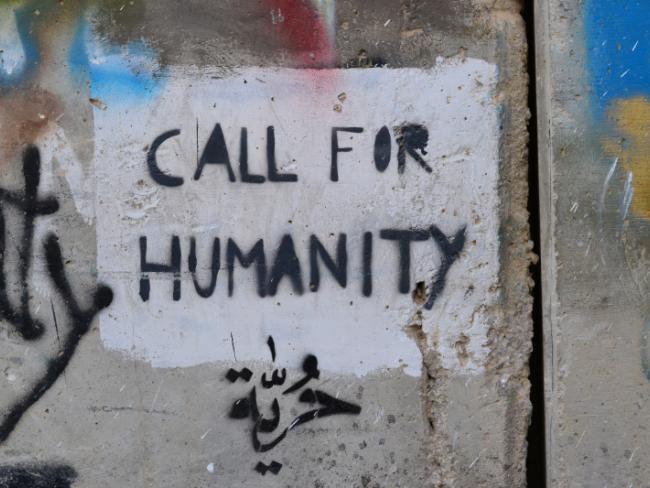
Art and writings on the wall in Bethlehem, between Palestine Westbank and Israel. Photo graceenee via Shutterstock.
Escalating military action in the Middle East threatens a wider war. That’s obvious, but what can workers in Britain do about it?
The British people need to be united and to assert Britain’s interests, which are the interests of the British people. We must not let the government divide us into factions clashing over foreign wars. We should never again be involved in wars abroad.
First, we should condemn the significant British involvement in actively flying sorties to destroy missiles aimed at Israel on 13 April. This is escalation which can do no good.
‘We must not let the government divide us into factions clashing over foreign wars. We should never again be involved in wars abroad.’
A later government statement said that the RAF was in fact defending British troops on the ground – and that increased British air activity also freed US warplanes involved in ongoing 10-year joint action against Islamic State.
That there is such an extensive and ongoing intervention in the region should be cause for concern – not a justification for escalation.
Second, we should call on the British government to do everything possible to work for an immediate and permanent ceasefire in Gaza. That would include relief for the people of Gaza – food and medicines primarily – without question and conditions.
The government’s position on ceasefire and relief has been equivocal. It is content to decry the “excessive” actions of the Israel Defence Force and to air drop token amounts of aid. But Palestinians are being assaulted by weapons exported from Britain, USA and Germany.
Third, we must reiterate condemnation of the attacks on Israel, by Hamas on 7 October 2023 and by Iran on 13 April. These actions will not bring about peace and security for Palestine, they risk escalating the conflict.
Missiles and drones from Iran over flew Iraq, which is still politically unstable after the disastrous US-led war and occupation. It risks being dragged into the conflict on one side or another. And in Yemen increased terrorist activity against shipping has escalated the civil war in Yemen, where Saudi Arabia and Iran have long been involved.
Fourth, we should condemn Israel’s actions against the people of Gaza and other extraterritorial attacks like that on the Iranian consulate in Syria. These acts are not justified as national self-defence, even in the face of terrorist attacks on its citizens. And to criticise Israel’s attacks is not antisemitic, any more than condemning Hamas terrorism is anti-Arab or anti-Palestinian.
We distinguish between peoples and organisations, including governments, which purport to speak in their name. Netanyahu does not distinguish between the two; he holds the whole people of Gaza responsible for Hamas’s terrorist actions.
The Palestinian people did not attack Israel, Hamas did. Hamas is not fighting a liberation struggle for them. Hamas was not very well regarded before the attacks on Israel – and its actions since have not achieved anything for Palestinians.
In fact the government of Israel is deeply unpopular. It was in crisis before the 7 October attacks and demonstrations against the government continue, despite some popular support for reprisals. The Israeli people are not waging war on Gaza, it is their government.
Likewise British armed forces in the region are acting on government orders, not in the interest of workers here in Britain.
The hard won experience of many generations of workers is that reaction abroad breeds reaction at home. Weak rulers always use a divided population to further their own aims in whipping up wars.
Most notably in our history, the First World War started at a time of intense class struggle in Britain (and for Ireland, the struggle to free itself of British rule).
The outbreak of WW1 changed everything, although it was not as popular with workers as history books claim. We can’t let that happen again.
Our government is deeply unpopular, too. And support for Labour is reluctant and cautious at best. We must not let any of them believe that to escalate wars abroad is any sort of answer.
And lastly, we must look at ourselves as workers. Do we tolerate those who foster division in our class, sometimes well meaning, but often not? Or do we assert what is right: no to foreign wars and adventures: no to bringing foreign conflicts to our streets and workplaces?
• A longer version of this article is on the web at www.cpbml.org.uk
